May 19, 2025 | 12:11 GMT +7
May 19, 2025 | 12:11 GMT +7
Hotline: 0913.378.918
May 19, 2025 | 12:11 GMT +7
Hotline: 0913.378.918
To develop a high-quality fruit tree material areas that meet export standards to China, Europe, and the United States, as well as distribution in the Van Van Loi brand store system, Chan Hung Sinh Loi (Sinh Loi Group) Agricultural Investment Joint Stock Company has chosen Binh Dinh as a target in the central region.
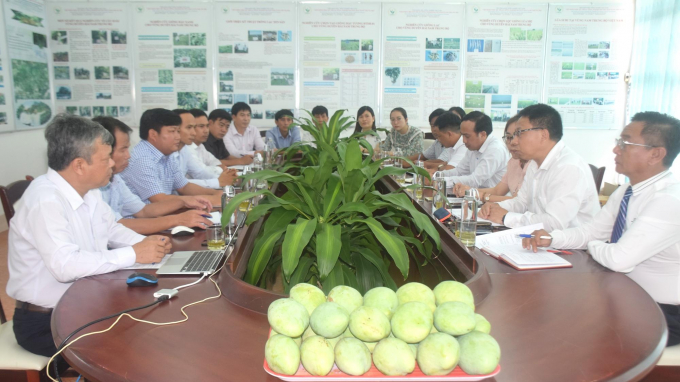
Sinh Loi Group and ASISOV worked on the strategic direction for the development of a large fruit tree material area in Binh Dinh. Photo: V.D.T.
To implement this strategy, leaders of Sinh Loi Group worked with the Agricultural Science Institute for Southern Coastal Central of Vietnam (ASISOV) on May 25 and signed a cooperation agreement in research and technology transfer.
According to Mr. Phan Thanh But, Chairman of Sinh Loi Group: Sinh Loi Group is a combined effort between Van Van Loi Agricultural Products Import-Export Company (Ben Tre) and Hang Sinh International Investment Company (China). The current development direction for Sinh Loi Group is to focus on transferring science and technology on plant varieties. Therefore, Sinh Loi Group needs to have a cooperative relationship with ASISOV, a unit specializing in research and transfer of agricultural science and technology in the South Central region.
“In addition to fruit trees, Sinh Loi Group will also develop eucalyptus trees on hillside lands of mountainous districts in Binh Dinh. This is an opportunity to create livelihoods for mountainous people and stabilize their lives", said Mr. But.
According to Mr. Truong Dien Sinh, Chairman of Hang Sinh International Investment Company, currently Deputy General Director of Sinh Loi Group, Sinh Loi Group's cooperation links will expand within the region, to agricultural cooperatives and farmers. The next goal is to export fruits and many other agricultural products from Binh Dinh and the South Central region to the Chinese market through official channels.
“Sinh Loi Group is currently affiliated with Hoa Dat Group - a large plant breeding and genetic research unit in China. Currently, Hoa Dat Group has more than 130 branches across the world but none in Vietnam. Sinh Loi Group has worked with Hoa Dat Group to set up a branch in Vietnam in the future. In addition, Sinh Loi Group also has many Chinese partners specializing in importing and exporting agricultural products situated in Vietnam", said Mr. Truong Dien Sinh.
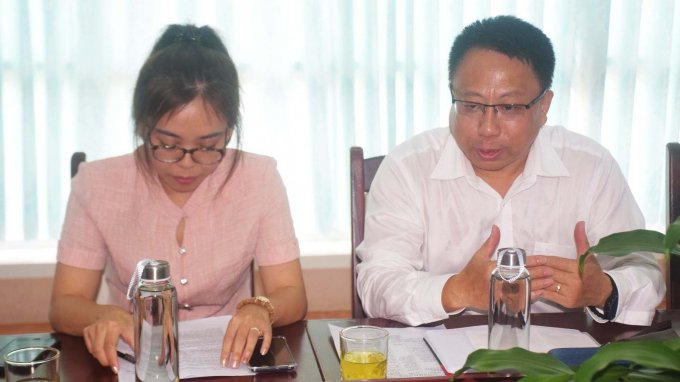
Mr. Truong Dien Sinh (right), Chairman of Hang Sinh International Investment Company, Deputy General Director of Sinh Loi Group. Photo: VDT.
Mr. Truong Dien Sinh also added that, trade and import of agricultural products between Vietnam and China were mainly carried out by small quotas in the past. Since the Covid-19 pandemic outbreak, the import-export trade between the two countries has been restricted due to China's pandemic prevention policy. Therefore, Sinh Loi Group's aims to export agricultural products to China officially by railroads.
To explain why the Group selected Binh Dinh as an investment target, Mr. Truong Dien Sinh affirmed that Binh Dinh has many advantages compared to other provinces in the Central region, especially in terms of traffic. Binh Dinh has an international seaport, a railway line and an upcoming highway. In terms of topography, Binh Dinh is surrounded by the sea and mainland. In terms of hills and mountains, Binh Dinh is more levelled compared to the Central Highlands. The Central Highlands only thrives on pepper and coffee, with little advantage to develop durian, pineapple due to the high terrain.
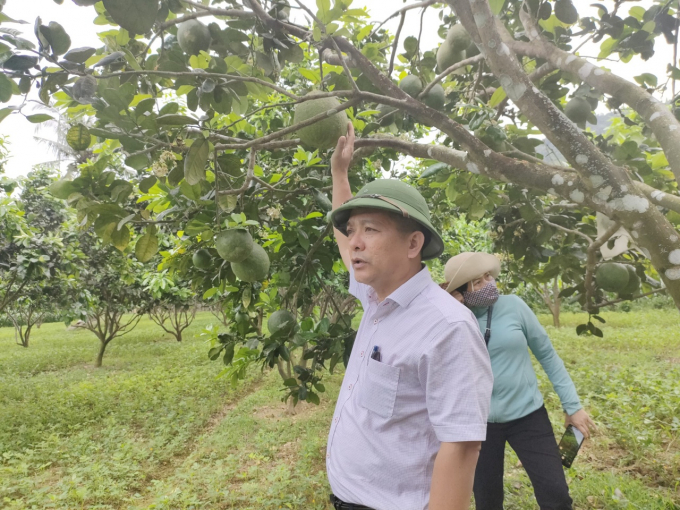
Binh Dinh has recently made a breakthrough in the development of fruit trees. Photo: VDT.
“Binh Dinh has a fairly levelled area, so it is suitable for the development of fruit trees. During the implementation process, we hope that relevant sectors will support the Group in granting planting area codes. To officially export to the Chinese market, products must be registered with a planting area code, a packaging facility code and an exporting company code. The group is looking forward to ASISOV's support in developing the material area for fruit trees and other agricultural products in Binh Dinh to revitalize the agricultural sector in the region", said Mr. Sinh.
Facing concerns about the grant and management of planting area codes for Sinh Loi Group's agricultural products, Dr. Ho Huy Cuong, Director of ASISOV said: This is a matter of great concern to the Ministry of Agriculture and Rural Development, required by Vietnam's agricultural product officially exporting to markets, including China.
Regarding the development of fruit tree material areas in Binh Dinh, ASISOV will cooperate closely. The function and mission of ASISOV is to research and transfer; The Institute has researched on varieties, propagation and cultivation processes for key crops of provinces in the South Central region.
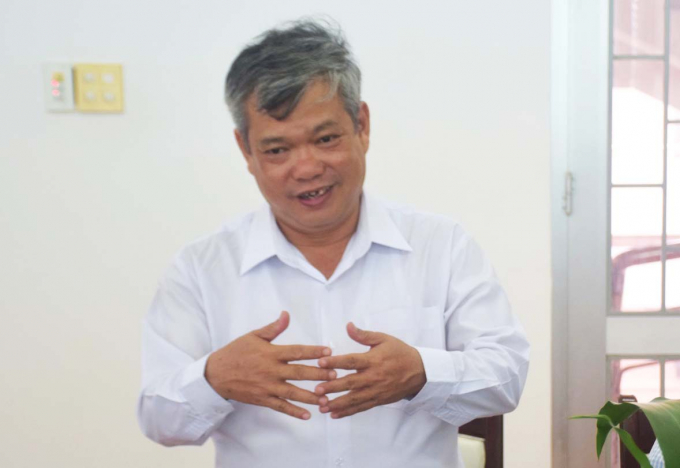
Dr. Ho Huy Cuong evaluated the advantages and outlooks of the large fruit tree material areas associated with export in the South Central provinces and in Binh Dinh. Photo: VDT.
During its operation, ASISOV has established relationships with local authorities and functional sectors, which is a facilitator for the cooperation between Sinh Loi Group and ASISOV in developing edible fruit tree ares in Binh Dinh and in the region.
“ASISOV is currently operating mainly in Khanh Hoa province, a key growing area for durian and mango in the South Central region and Binh Dinh, a key mango growing area; especially the sand mold mango variety with thick skin, suitable for transportation during export.
Regarding coconut trees, the Institute is focusing on the water-drinking Siamese coconut variety of Tam Quan (Hoai Nhon Town, Binh Dinh). Tam Quan Siamese coconut variety includes green Siamese coconut and red Siamese coconut. The coconut area in Binh Dinh ranges from 12,000 to 14,000 ha, mainly concentrated on sandy land, extending from Phu Cat and Phu My districts to Hoai Nhon town.
Coconuts on sandy coastal areas have very sweet water. If the coconut is peeled and sold, there will be a large domestic market share, I hope the Group will focus on this product in the near future", said Dr. Ho Huy Cuong.
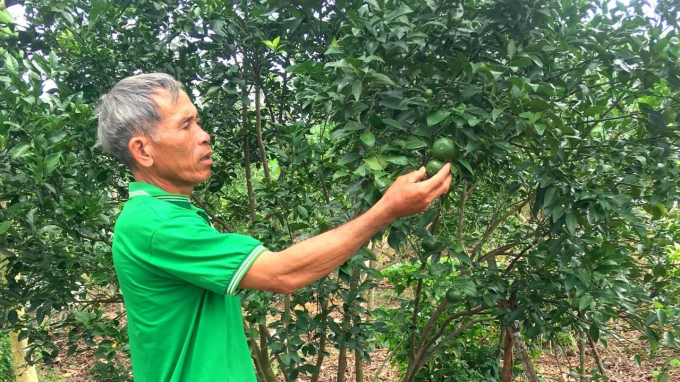
The land fund for hilly and semi-mountainous terrain beneficial to the development of concentrated and large-scale fruit trees in Binh Dinh is still abundant. Photo: VDT.
According to Dr. Ho Huy Cuong, it is currently the peak time for Binh Dinh to develop the supply chain of agricultural products. In this chain, the province is lacking in participating businesses. Sinh Loi Group's investment in Binh Dinh at this period is ideal.
Currently, the total area of fruit trees in Binh Dinh and other the South Central provinces, including the fringes of the Central Highlands provinces, is lower than that of the Mekong Delta. But fruit trees in the South Central and the Central Highlands were developed after the fruit trees in the Mekong Delta, so it will be more favorable to design planting areas according to good agricultural practice standards, meeting requirements of the world markets.
"This will be an opportunity for businesses to invest in the field of fruit trees in the South Central region and for Sinh Loi Group to invest in Binh Dinh. In addition, the South Central region has not developed fruit trees strongly, so it will not take 3 to 4 years for investment to solve the inadequacies in fruit tree production such as the overuse of fertilizers and pesticides; instead, the region will have advantages for organic development from the very beginning", emphasized Dr. Ho Huy Cuong.
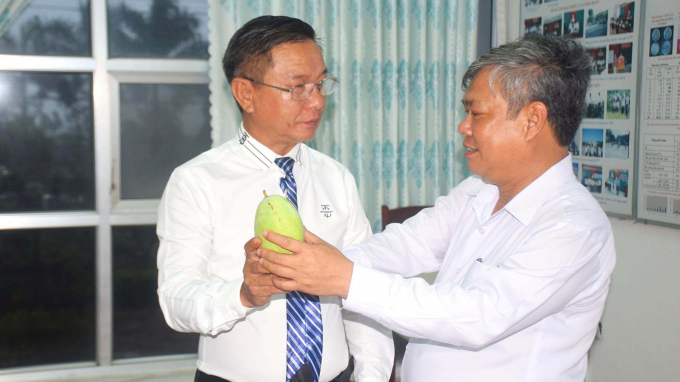
Mr. Phan Thanh But (left), Chairman of Sinh Loi Group and Dr. Ho Huy Cuong, Director of ASISOV discussing about mango, a product that attracted Sinh Loi Group. Photo: V.D.T.
“Another great advantage is that the three provinces of Kon Tum, Binh Dinh and Gia Lai have been approved to build highways. The truck route from Gia Lai to Binh Dinh currently takes 3 hours, but with a highway, this duration will be shortened to only 1 and a half hour. Durian trees planted on Gia Lai in May and June were harvested, coinciding with the durian harvest time in the Mekong Delta. As for durian trees grown in Binh Dinh or in the South Central provinces, the harvesting period falls in July-August. The differences in durian harvesting period of different regions will ensure product output for export", analyzed Dr. Ho Huy Cuong.
Translated by Nguyen Hai Long

(VAN) 14 out of 35 domesticated elephants in Dak Lak province have had their living conditions improved, with 11 of them currently participating in the non-riding elephant tourism model.

(VAN) Muong Nhe Nature Reserve hopes that being upgraded to a national park will lay the foundation for forest protection efforts to be carried out in a systematic, modern, and sustainable manner.
/2025/05/16/3923-2-171845_52.jpg)
(VAN) Lower costs, higher yields, and improved soil quality are outstanding benefits that soybeans bring when integrated into the crop rotation system.

(VAN) The 'For a Green National Environment' programme aims to promote a green lifestyle, support businesses in implementing ESG practices, and turn Net Zero commitments into concrete actions.

(VAN) Cold-barn systems efficiently manage environmental and temperature conditions, which aids in the prevention of respiratory diseases in pigs and protects them from the vectors that transmit African swine fevers.

(VAN) To tackle challenges, the project 'Addressing key technical bottlenecks in the grouper supply chain in Vietnam' has been underway since 2024.

(VAN) The project 'Disease-Resilient and Sustainable Cassava Production Systems in the Mekong Region', funded by the Australian Center for International Agricultural Research (ACIAR), is being implemented from 2024 to 2028.